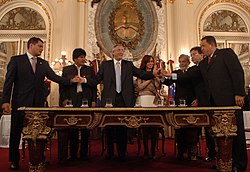Founding
The concept was first raised during the first presidential campaign of Venezuelan President Hugo Chávez, in 1998. [5] Chavez consulted regularly with Mark Weisbrot, [8] who has been described as the "intellectual architect" of the project. [9] [10] [11] The concept was originally launched in 2006 in a cooperation between Venezuela and Argentina, led by their respective Presidents Hugo Chávez and Néstor Kirchner. [12]
In May 2007, a meeting in Quito led to the official creation of the bank, and was said to indisputably signify another step towards Latin American integration. [6]
Seven South American nations met in Rio de Janeiro on 8 October 2007, to plan the beginning of the Bank. It was announced that the Bank will be headquartered in Caracas, Venezuela, and would begin operations on 3 November 2007; this was later postponed to 5 December 2007, [13] and then to 9 December 2007. [14] Representatives from Argentina, Bolivia, Brazil, Ecuador, Paraguay, Uruguay and Venezuela were present at the meeting. All 12 South American countries will be eligible to borrow from the Bank. In a surprise move, Colombia formally requested membership in the bank on 13 October 2007. As of 25 April 2008, the bank was still awaiting its member nations to have their local legislatures approve their individual capital investments. Member voting rights were yet to be determined at that time. [15]
In March 2009 a number of Latin American nations agreed to contribute US$7 billion towards the bank's start-up capital. Venezuela, Argentina, and Brazil are to contribute $2 billion each, and Ecuador, Bolivia, Paraguay, and Uruguay agreed to contribute varying amounts to provide the remaining US$1 billion. [16]
On 26 September 2009, the presidents of Argentina, Brazil, Paraguay, Uruguay, Ecuador, Bolivia and Venezuela signed an agreement establishing the South Bank with an initial capital of US$20 billion. Leaders including Brazilian President Luiz Inácio Lula da Silva and Argentina's Cristina Fernández de Kirchner formally signed up to the pact and announced that the starting capital would be US$20 billion. It was unclear how much each country would contribute, but under the previous US$7 billion figure announced in May, Argentina, Venezuela and Brazil were to have each pledged US$2 billion, while Uruguay, Ecuador, Paraguay and Bolivia were to have invested smaller amounts. [1] [2]

